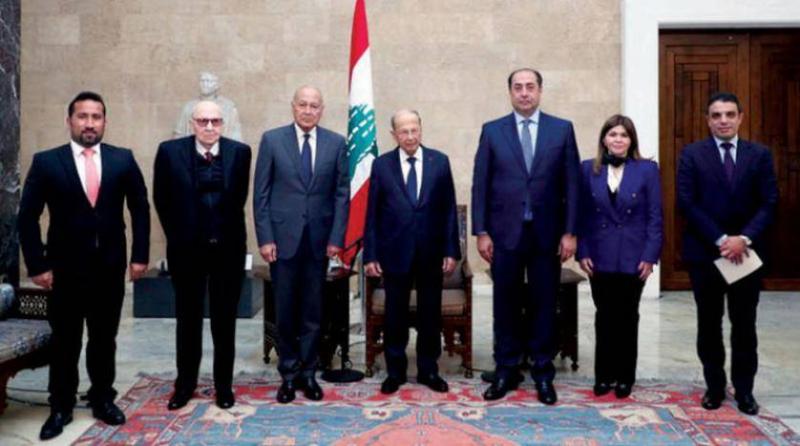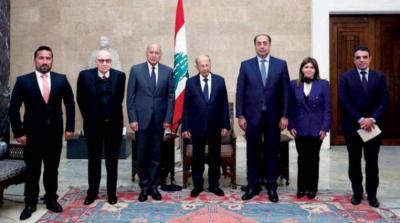The Secretary-General of the Arab League, Ahmed Abu Gheit, conveyed to Lebanese officials his responses regarding Lebanon's reply to the Kuwaiti initiative, which outlined a path for restoring relations with Gulf states to their natural course, refusing to discuss them publicly. He expressed hope that "this initiative could move forward to rebuild trust with Lebanon."
Abu Gheit met in Lebanon yesterday (Monday) with President Michel Aoun, Parliament Speaker Nabih Berri, and Prime Minister Najib Mikati. Today (Tuesday), Abu Gheit is participating in the "Arab Forum for Sustainable Development," which is being launched by the United Nations Economic and Social Commission for Western Asia (ESCWA). During the meeting, Aoun confirmed that the parliamentary elections would take place on time, calling for urgent action regarding the issue of Syrian refugees in Lebanon. He emphasized that "the file of Syrian displaced persons in Lebanon continues to weigh heavily on the general Lebanese situation, which necessitates urgent addressing, especially since fighting has ceased in most Syrian areas."
Abu Gheit stated after his meeting with Aoun that he found a determination to hold the elections on time and to push Lebanon towards greater stability and the restoration of conditions in the upcoming period. He noted that he listened to "the president's assessment of the international situation and its impacts on the Arab region, especially since Lebanon currently holds the presidency of the Arab Ministerial Council for six months, and I informed him about the confirmation of the upcoming consultative ministerial meeting in Beirut in mid this year," indicating that he found in Aoun "a lot of determination to proceed with Lebanon on the path of elections and achieving stability and restoring normal conditions." He expressed the Arab League's readiness to send a team to monitor the elections in Lebanon, stating, "We have previously taken this step in Algeria, Iraq, Palestine, and many areas, and I believe we will implement this matter."
In response to a question about Lebanon's answer to the Kuwaiti initiative, Abu Gheit said, "I informed the president what I had in terms of responses; I cannot speak about them publicly, and I also informed him of the result of the contacts we made in this context."
He pointed out that the upcoming Arab summit was also discussed with President Aoun, saying Algeria informed all Arab states that the summit will be held on November 1 and 2 in Algeria.
When asked if the issue of Syrian refugees was discussed, Abu Gheit replied, "We touched on this topic. In fact, when one sees what Lebanon has endured over the past 10 years or more, the price it has paid, and the conditions this hospitable country has suffered due to the presence of hundreds of thousands, if not millions, of Syrian refugees, and not receiving support from the world, at a time when we witness the situation in Ukraine and the European and international mobilization to assist Ukrainian refugees, it forces one to question these double standards. The Ukrainian crisis exists, but the world should not forget the pressing situation in Lebanon due to the presence of Arab refugees on its territory, whom it has hosted for many years without any external support. This is a point that we must raise consistently, especially in the current context."
After meeting with Prime Minister Najib Mikati, Abu Gheit expressed his hope that "the Arab initiative to rebuild trust with Lebanon will move forward," confirming that "the Arab initiative exists in general, and we can say we hope it will advance." He described his meeting with Mikati as "extremely useful," noting: "We discussed the Lebanese situation and the upcoming elections, touched on the international situation and its impacts on the conditions in the Middle East, the Eastern Mediterranean, Lebanon, and the Arab states, as well as discussed the Kuwaiti-Gulf initiative." He indicated that he feels "hope for a better future for this ancient country," noting that there are upcoming elections that will contribute to achieving stability, reconciliation, forming a new government, and launching initiatives with the International Monetary Fund because the key is with them, and all this depends on political movement within Lebanon since the elections will be decisive."
Kuwaiti Foreign Minister Sheikh Ahmed Nasser Al-Mohammad Al-Sabah visited Lebanon last January and announced that his visit to Lebanon had an Arab character and was part of various international efforts to rebuild trust with Lebanon, carrying three messages related to solidarity with the Lebanese people, urging Lebanon not to interfere in the affairs of Arab states, and demanding that Lebanon fulfill its international commitments. Lebanese Foreign Minister Abdullah Bou-Habib delivered Lebanon's response to the initiative to his Kuwaiti counterpart during his visit to Kuwait on January 30.




